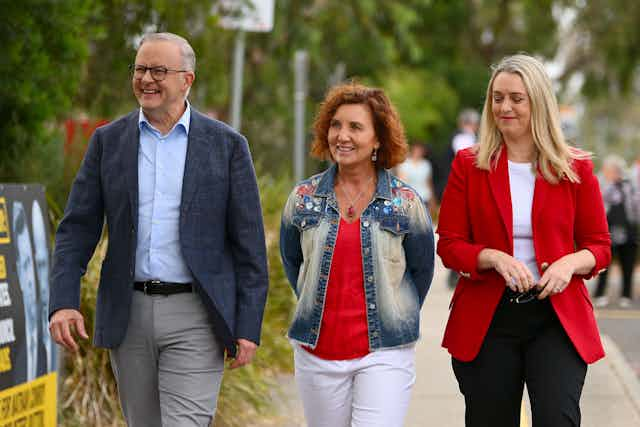With all ordinary booths in Dunkley having primary vote counts and 51% of enrolled votes counted, The Poll Bludger is projecting a final Labor margin of 52.6–47.4, a 3.6% swing to the Liberals. This means Labor candidate Jodie Belyea will win the seat after a byelection was called in the wake of the death of former MP Peta Murphy. There have also been some postals and pre-poll votes included. The Poll Bludger’s Labor win probability is 99%.
This would be a reasonable result for Labor, as analyst Kevin Bonham said the average swing against governments in government-held seats at byelections is 6.1% since federation, and 6.3% in the last 40 years.
Labor holding Dunkley will be a big relief for the party, but it does not predict the next election result. There were four national polls taken last week, and only Newspoll gave Labor a steady lead, with slumps for Labor in Resolve, Essential and Morgan polls.
It’s still likely over a year until the next federal election. What happens in the polls over that time is far more important than the result of this byelection.
Coalition takes lead in Essential for first time this term
A national Essential poll, conducted February 21–25 from a sample of 1,145, gave the Coalition a 48–47 lead including undecided, a reversal of a 50–46 Labor lead last fortnight. This is the first lead for the Coalition this term in this poll.
Primary votes were 35% Coalition (up one), 30% Labor (down one), 13% Greens (down one), 7% One Nation (steady), 2% UAP (up one), 8% for all Others (down one) and 4% undecided (down one). Bonham estimated a Labor lead of 51.4–48.6 from the primaries using 2022 election preference flows, but respondent preferences have been bad for Labor.
Albanese’s net approval improved one point from January to -5, with 47% disapproving and 42% approving. Dutton’s net approval also improved one point to -4.
Labor led the Coalition by 41–28 on supporting higher wages and better working conditions and by 31–23 on addressing climate change. But the Coalition led by 33–28 on reducing cost of living pressures and by 41–23 on keeping Australia’s borders secure.
By 62–19, voters supported making “doxing” (publicly releasing private individual data with malicious intent) a criminal offence. By 76–8, voters would support random alcohol and drug testing of politicians.
Morgan poll and additional questions from Resolve and Newspoll
In this week’s federal Morgan poll, conducted February 19–25 from a sample of 1,682, Labor and the Coalition were tied at 50–50, a 2.5-point gain for the Coalition since the previous week. Primary votes were 38% Coalition (up one), 31.5% Labor (down 2.5), 12% Greens (down one), 5% One Nation (up one) and 13.5% for all Others (up 1.5).
I previously covered the federal Resolve poll and Newspoll that were conducted in late February. Additional questions are below.
Newspoll asked voters their opinion of a proposal to build several small modular nuclear reactors to produce zero-emissions energy on the sites of existing coal-fired power stations once they are retired, finding a 55–31 approval margin. This question is biased in favour of nuclear reactors as it didn’t suggest any other options for replacement.
In the Resolve poll for Nine newspapers, 35% expected the economy to get worse in the next year, 30% get better and 19% stay the same. There was more pessimism for shorter time horizons (six months and three months).
Asked whether the changes to the stage three tax cuts were a broken promise or a changed policy to suit the times, by 46–34 voters backed the changed policy. On whether voters would personally be better or worse off under the changes, 25% said better off, 20% worse off and 55% no change.
By 36–23, voters supported the use of nuclear power, with 27% saying they did not have a strong view and were open to the government investigating its use.
On alcohol in parliament, 68% said politicians should not drink at all during work hours, 20% they could, but not to excess and 4% said drinking alcohol was fine. The most popular options for dealing with an MP suspected of being under the influence were alcohol and drug tests (55% support) and a temporary suspension from parliament (53% support).
Tasmanian EMRS poll: Liberals lead, but likely short of majority
The Tasmanian state election will be held on March 23. An EMRS poll, conducted February 15–21 from a sample of 1,000 – after the election was announced – gave the Liberals 39% (steady since November), Labor 26% (down three), the Greens 12% (steady), the Jacqui Lambie Network 9% (new) and independents 14% (down three).
Incumbent Liberal Premier Jeremy Rockliff led Labor’s Rebecca White as preferred premier by 41–38 (42–35 in November).
Tasmania uses a proportional representation system, so a two party estimate is not applicable. At this election, there will be 35 lower house seats, up from 25 previously. These will be elected in five seven-member electorates, with the quota for election reduced from one-sixth or 16.7% to one-eighth or 12.5%.
Bonham, who is a Tasmanian, estimated that if this poll was accurate, the Liberals would win 15–16 seats, Labor 10, the Greens 2–3, the JLN 2–3 and independents 3–5. If this is the result, the Liberals would be short of the 18 seats needed for a majority, but would likely continue as a minority government.
Bonham also reported on a Tasmanian poll for the Hospitality Association from a large sample of 4,000 taken during the first week of the campaign that was published by The Mercury. Seat numbers in this poll would be similar to the EMRS poll.

